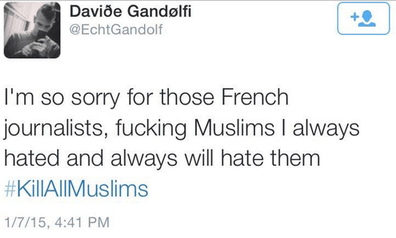Nearly every other week, the internet is on the brink of explosion as citizen journalists fall over each other to inform readers about the latest global tragedy. This week is no different.
On January 7th a satirical newspaper in Paris, Charlie Hebdo, was attacked by three masked gunmen. The death toll now stands at twelve, two of those people being members of the Paris Police Department. This death toll is not expected to change according to most major news outlets.
As a news consumer who trusts very little of what’s actually on the news, I watched the unfortunate event evolve across the Twittersphere. Before the clock struck noon I was loaded with unconfirmed information and inaccurate death counts, but the core of the story was the same: innocents were being murdered. As speculation surrounding the gunmen increased the tragedy was wrapped neatly into a hashtag for the world to track: #JeSuisCharlie. I am Charlie, in French, was one of Twitter’s trending topics of the day. As my timeline filled with folks who called themselves Charlie, I couldn’t help but think, are you really?
Charlie Hebdo is a satirical French newspaper that is known for publishing offensive cartoons. Several years ago, Charlie Hebdo gained worldwide recognition for publishing a cartoon of Prophet Muhammed (peace be upon him) which sparked an unimaginable controversy. In fact, there are numerous cartoons published by Charlie Hebdo that make fun of the Prophet and of Islam as a whole. I suppose that’s why I was so shocked when I realized that more than half of the people proclaiming #JeSuisCharlie were Muslim.
Solidarity tags like this one and its predecessors, such as #IamMikeBrown and #ICantBreathe, are the newest ways for people to show their support for a cause or a victim of injustice. I’ve always been skeptical of these kinds of things. Solidarity implies that we stand as one not that we have become one. I cannot be one with a newspaper that spews hate for my religion.
//
This mass murder does not expunge the record of Charlie Hebdo. On the same note, the prejudice of this newspaper does not in any way shape or form call for any act of violence. The cartoonists of Charlie Hebdo have shown great insensitivity and ignorance but I wouldn’t so much as wish a paper cut on any of them.
And yet, a second hashtag managed to suction cup itself to this tragedy: #KillAllMuslims. This was a trending topic on Twitter. To be a trending topic, a hashtag must ecru upwards of 6,000 tweets from unique users. So while Muslims were calling themselves Charlie, more than 6,000 unique users thought that it would be a smart idea to eradicate about 1.6 billion people.



That is how these situations have played out in the media. The media picked it up as an attack on freedom of speech. An attack on freedom of speech is an opportunity to exasperate the already-existing Islamophobic slurs that “they” hate our freedom and liberal ideals. This sets us up for the racist, cliche, and inaccurate “us” vs. “them” scenario — “a clash of civilizations.” We have now widened the gap and further “Othered” an entire religion of people.
In this moment, as a young Muslim, it’s easy to sink into the idea that we are the most hated people in recent history. But we aren’t. It was only a month ago that the Australian Twitterverse brought us #IllRideWithYou to show support for their Muslim community after a gunman took hostages at a Sydney cafe. The hashtag, which trended across Twitter and Facebook, was an invite to any Muslim person that did not feel safe riding public transportation or walking home to be accompanied by a non-Muslim person that was on the same route. The Internet applauded this action. Finally, people were bridging the gap — world peace was close at hand!
So how did we go from ‘riding with’ to ‘killing all’?
It’s all an unbelievable idea when you consider the fact that Muslim citizen journalists carried this story on multiple media platforms. Muslim Parisians stood up for Charlie Hebdo even after Charlie Hebdo relentlessly defamed them. And it will be Muslim people that take to Twitter, and Facebook, and all kinds of blogs to remind the world, once again, that we do not condone violence. While I can’t even begin to fathom the damage this tragedy has done to the people of Paris and of Charlie Hebdo, let one thing be clear: #JeNeSuisPasCharlie.


Beautifully written! #JeNeSuisPasCharlie #JeSuisAhmed